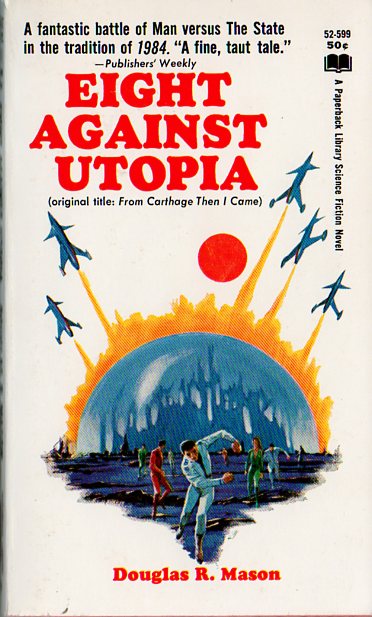

|
| Cover art by Jack Gaughan |
| EIGHT AGAINST UTOPIA Douglas R. Mason New York: Paperack Library, December 1967 |
Rating: 3.5 Fair |
|||
| ISBN-13 978-0-610-? | ||||
| ASIN: B000B7PIC2 | 158pp. | SC | $0.50 | |
For seventy centuries the domed city of Carthage, located on the northern shore of Africa like its historical namesake, had sheltered its residents as ice sheets pushed down across Europe. Inside was womblike comfort, with temperature held to a steady 19.4°C and every need provided. Every need except freedom, that is. For conformity was the price of citizenship in this Carthage. Its technology enabled constant physiological monitoring of everyone; excessive emotion, or even aberrant thoughts, could be detected, and would earn a trip to the reconditioning center.
Some people found the life of Carthage unfulfilling. Gaul Kalman was such a one. A Senior Engineer, he was among those responsible for keeping the city facilities powered and making sure none of them used more than their share. He gathered around him a band of like-minded people, assigned them tasks, and planned an escape. Working quickly while guarding their thoughts, these rebels collected gear and supplies, prepared an escape route, and placed devices to sabotage the power system. The last precaution was necessary because the city had an antihostility screen for defense against marauders from the south; it would be equally deadly to anyone trying to leave.
The group has some luck: in setting up that escape route, they find an old ambulance in its bay against the city wall. They check it out and find it operable, and stock it with the gear they've collected. When the day comes, they just manage to get away in it, dodging the heat beams of the civil guard in the process. But Gaul and two companions don't make it to the rendezvous. They have to improvise another escape route, descending on ropes from the top of the dome. Both groups endure harrowing adventures, finally meeting up and finding a working patrol boat which takes them to England, far enough from Carthage that they can safely settle down and make a new life for themselves.
"He had the privilege of the uncomplicated gaze of warm eyes in a full oval face, red-gold hair in a deep bell, which swung elastically as she turned and made its own special contribution to the color orchestration of the section, straight nose, serious mouth, short upperlip. It was a satisfying face to look at. He found his mathematical, engineer's brain was analyzing it in a detached kind of way. In the few seconds he met her direct look, before the silence forced him to say something else, he had established that the width of the head was just equal to the distance from eyebrows to chin. The relation of the portion above the brows to that below was recognizable as a familiar standard, .383 to .617." – Pages 9-10 |
The tale has plenty of action and jeopardy. There are not many grammatical errors (2 or 3 typos, and what may be missing words or perhaps Britishisms; the author is obviously from the United Kingdom.1) I detected only one continuity error: on one page, the power pack is described as useful; on the next it is discarded as drained.
It is overall a good read. However, three defects caused me to mark it down three notches. First, the dialog is stilted; Mason throws in too many obscure quotations; and there are lots of passages describing the physical attributes of the women, which today would be considered sexist. (See the quotation above.) Second is the impromptu nature of the selection process Gaul uses to select his fellow escapees; it comes down to gut feeling (and in two cases proves incorrect.) And third is the ease with which they go about setting up that escape route: cutting holes in walls with "matter pulverizers", climbing up and down ropes; working without masks in dusty environments; drawing power to charge the battery in the ambulance, and to lift the heavy outer door of its bay. None of this triggers any alarms, apparently — neither the mental monitors or any other sort. Once they are outside, their actions and situations are very plausible, but their preparations for escape struck me as dodgy. Hence I put Eight Against Utopia2 in the "fair" category and do not recommend it.

 To contact Chris Winter, send email to this address.
To contact Chris Winter, send email to this address.